|
Author
|
Topic: Apollo 11 CM quarantine aboard USS Hornet
|
LM-12
Member Posts: 4050
From: Ontario, Canada
Registered: Oct 2010
|
 posted 08-15-2019 06:36 AM
posted 08-15-2019 06:36 AM
  
Which crane lifted the command module off the Hornet? Photos seem to show a large crane on the pier near the CM, and a larger crane on the port side of the ship. A larger crane on the port side? |
ea757grrl
Member Posts: 818
From: South Carolina
Registered: Jul 2006
|
 posted 08-15-2019 10:47 AM
posted 08-15-2019 10:47 AM
   
The big crane on the pier most likely hoisted the command module from the ship. The crane ran on tracks along the pier and could be moved to whatever position was needed. It could be moved aft to hoist the MQF off the ship, then moved forward to offload the CM from its spot on the forward flight deck. These big cranes are often used to onload/offload aircraft and other equipment from carrier decks and so forth, so it would be a fairly routine thing to do. |
LM-12
Member Posts: 4050
From: Ontario, Canada
Registered: Oct 2010
|
 posted 08-15-2019 10:56 AM
posted 08-15-2019 10:56 AM
  
This photo (as posted earlier) shows two large cranes facing each other on the pier beside the Hornet. I get that.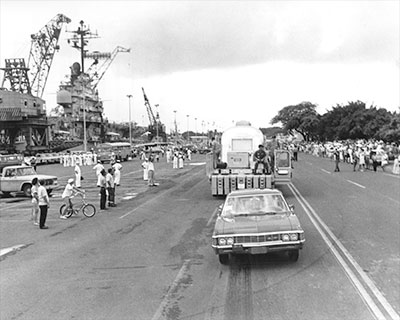 What I don't get is the larger crane seen in the above photo behind (as we see it) the Hornet island. It looks like you can also see that crane behind the command module in this photo (Hornet's bow is to the right): 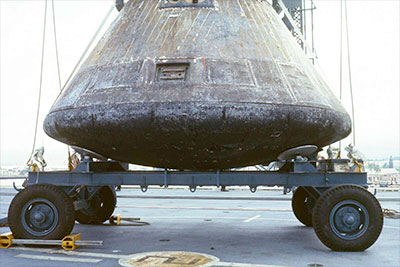 |
ea757grrl
Member Posts: 818
From: South Carolina
Registered: Jul 2006
|
 posted 08-15-2019 08:57 PM
posted 08-15-2019 08:57 PM
   
The big gantry crane by the aft elevator would have been the one that offloaded the MQF. This is substantiated by the July 27, 1969 Honolulu Advertiser, which covered Hornet's return to Pearl Harbor pretty extensively.Given the position of the other gantry crane close to the bow of the ship, that is most likely the crane that offloaded the CM. The Advertiser's coverage has a photo showing the CM about to be hoisted off, and the hook assembly on that crane is the style that would have been on the gantry crane, hence my conclusion. I am not certain what is going on with the other crane that appears to be on Hornet's port side. It's only seen in passing in the video linked upthread. It wouldn't make sense for a crane on the port side to offload the CM, not when the operator of the pierside gantry crane would have an unobstructed view of where to place the CM on the pier. I could well be wrong, but it makes more sense to me that the other gantry crane offloaded the CM. |
LM-12
Member Posts: 4050
From: Ontario, Canada
Registered: Oct 2010
|
 posted 08-16-2019 12:37 AM
posted 08-16-2019 12:37 AM
  
I agree with what you said about the two cranes on the pier. That makes sense.But that third crane that appears to be on the port side is a bit of a head-scratcher. Why would a third crane be needed? And it is a very large crane. I'm beginning to think that maybe it was not on the Hornet deck, but on some type of floating barge on the port side of the ship.
|
oly
Member Posts: 1485
From: Perth, Western Australia
Registered: Apr 2015
|
 posted 08-16-2019 04:07 AM
posted 08-16-2019 04:07 AM
   
This image shows the MQF being lowered by crane on to the mobile transporter/loader: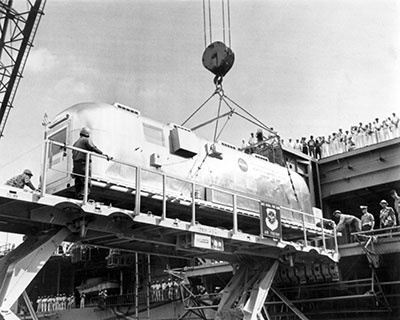 This image looks to have been taken after: 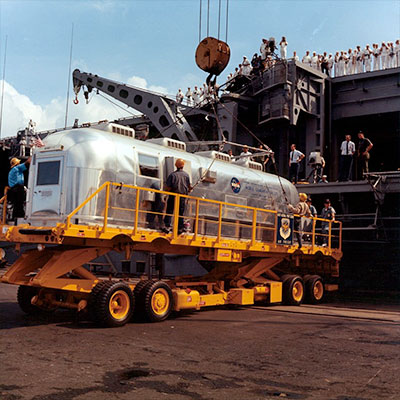 |
LM-12
Member Posts: 4050
From: Ontario, Canada
Registered: Oct 2010
|
 posted 09-11-2019 04:53 AM
posted 09-11-2019 04:53 AM
  
Here are two more photos that show the Apollo 11 command module on the flight deck as the USS Hornet arrived at Pearl Harbor. That might be a crane barge at bottom right in the second photo.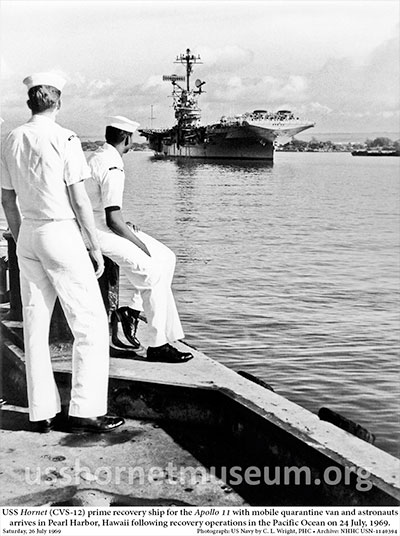 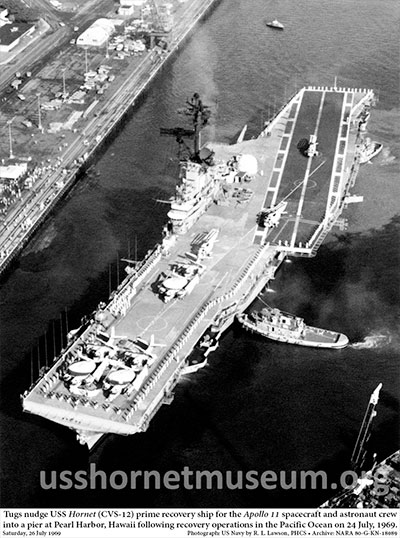
|
LM-12
Member Posts: 4050
From: Ontario, Canada
Registered: Oct 2010
|
 posted 12-04-2021 01:00 AM
posted 12-04-2021 01:00 AM
  
Here is another overhead view of the USS Hornet arriving at Pearl Harbor with the Apollo 11 command module on the forward deck. The photo is one of many very interesting recovery photos found on this website. 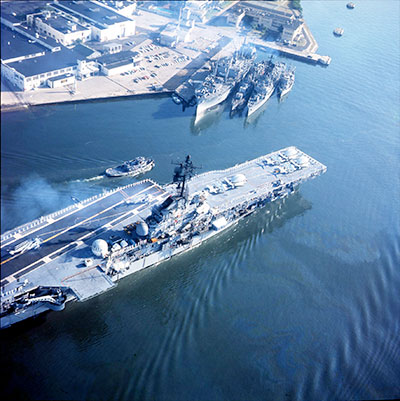 |
LM-12
Member Posts: 4050
From: Ontario, Canada
Registered: Oct 2010
|
 posted 12-05-2021 03:35 PM
posted 12-05-2021 03:35 PM
  
That must be Navy swimmer Clancy Hatleberg wiping down the raft, with crap (betadine, most likely) all over his mask. He appears to be wearing a large Apollo 11 patch on his biological isolation garment.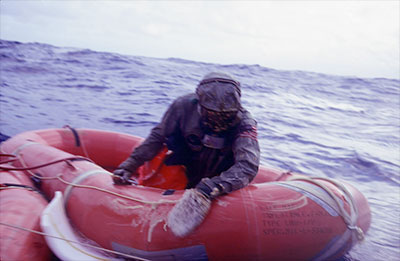 |
jklier
Member Posts: 91
From: Austin, Texas
Registered: Aug 2007
|
 posted 12-06-2021 12:44 PM
posted 12-06-2021 12:44 PM
   
Looks like a Navy issue carwash mitten.  |
LM-12
Member Posts: 4050
From: Ontario, Canada
Registered: Oct 2010
|
 posted 03-27-2023 08:59 PM
posted 03-27-2023 08:59 PM
  
quote:
Originally posted by LM-12:
That must be Navy swimmer Clancy Hatleberg...
Lots more Apollo 11 recovery photos found here, including more shots of Hatleberg, and the command module on the Hornet flight deck. |
Jurg Bolli
Member Posts: 1251
From: Albuquerque, NM
Registered: Nov 2000
|
 posted 03-27-2023 09:25 PM
posted 03-27-2023 09:25 PM
   
Fabulous collection of photos, thanks for the link! |
LM-12
Member Posts: 4050
From: Ontario, Canada
Registered: Oct 2010
|
 posted 03-28-2023 01:34 AM
posted 03-28-2023 01:34 AM
  
I would say the photos of Hatleberg wiping down the raft were taken after the astronauts were hoisted up to the helicopter. |
MartinAir
Member Posts: 427
From:
Registered: Oct 2020
|
 posted 03-28-2023 05:58 AM
posted 03-28-2023 05:58 AM
   
The best Betadine ad ever.  |
MartinAir
Member Posts: 427
From:
Registered: Oct 2020
|
 posted 03-29-2023 08:57 AM
posted 03-29-2023 08:57 AM
   
Was Betadine used only during the recovery/processing of the Apollo 11 CM Columbia? |
Blackarrow
Member Posts: 3796
From: Belfast, United Kingdom
Registered: Feb 2002
|
 posted 03-29-2023 11:21 AM
posted 03-29-2023 11:21 AM
  
quote:
Originally posted by LM-12:
Lots more Apollo 11 recovery photos here...
All those pictures, but unless I missed something, not a single photo of Apollo 11 splashdown. No splashdown photo in the Apollo Image Gallery either. The book "Moon Men Return" by Scott W. Carmichael (Naval Institute Press, 2010) does contain a rather grainy black and white photo taken immediately after the CM hit the ocean, but the book says the photo was "never released to the public."There is also a colour photo on p.782 of the "National Geographic" for December 1969, showing "Columbia" on main chutes descending towards the ocean. These photos were taken by two different photographers. Do any other photographs exist showing the final stages of the capsule descending and splashing down (i.e. with all three parachutes still inflated)? |
LM-12
Member Posts: 4050
From: Ontario, Canada
Registered: Oct 2010
|
 posted 03-29-2023 12:03 PM
posted 03-29-2023 12:03 PM
  
Apart from the grainy black and white photo that you mentioned, the earliest Apollo 11 splashdown photo I have seen is the command module in the Stable 2 position. |
Blackarrow
Member Posts: 3796
From: Belfast, United Kingdom
Registered: Feb 2002
|
 posted 03-29-2023 05:45 PM
posted 03-29-2023 05:45 PM
  
It occurs to me that the "grainy B&W photo" was probably taken in colour, but all of the photos in "Moon Men Return" are printed in B&W.It also occurs to me that most space-enthusiasts may never have seen a photograph of 'Columbia' actually descending on parachutes or splashing down. Even specialist books ("One Giant Leap" by Bizony; "Spaceshots and Snapshots of Project Apollo" by Bisney and Pickering; "Picturing Apollo 11" by Pickering & Bisney) do not contain any such photos. Is this something to do with copyright issues? Given the historic nature of the mission and the importance of any mission photographs, why are those two pictures not more widely known? The issue of [the almost complete lack of] lunar surface imagery of Armstrong has been much discussed. Surely the issue of Apollo 11 splashdown imagery is also historically important? |
LM-12
Member Posts: 4050
From: Ontario, Canada
Registered: Oct 2010
|
 posted 03-30-2023 02:30 PM
posted 03-30-2023 02:30 PM
  
Another photo of the Apollo 11 command module on a dolly on the Hornet flight deck can be found here.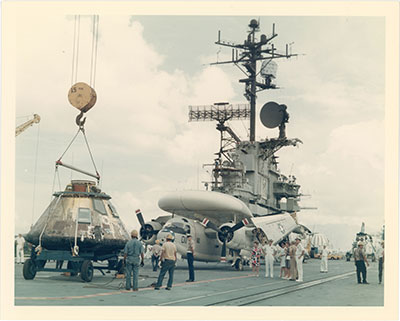 |
Blackarrow
Member Posts: 3796
From: Belfast, United Kingdom
Registered: Feb 2002
|
 posted 03-31-2023 07:52 PM
posted 03-31-2023 07:52 PM
  
A nice picture, which I don't think I've seen before, but that doesn't help with the question I asked earlier: why are pictures of the Apollo 11 splashdown (i.e. Columbia hanging from its parachutes and hitting the water) not widely available? Even if the two pictures referred to above are the only pictures taken, they still represent a crucial part of the Apollo 11 record and should be included in any photo database of the mission. Why aren't they? |
Robert Pearlman
Editor Posts: 53905
From: Houston, TX
Registered: Nov 1999
|
 posted 03-31-2023 10:09 PM
posted 03-31-2023 10:09 PM
   
Helicopter pilot Bruce Johnson addressed this (these) question(s) in a talk given at The Museum of Flight in Seattle in 2019. This is the only picture that we have of the capsule as it was coming down before it hit the water.It was actually a very cloudy day and I'm surprised that this came out as well as it did. It's probably been retouched many times. The photo helicopter was too far away when the capsule came down. This was taken by one of the swimmers. They were given small cameras that were sealed up for taking pictures in the water and so it's not entirely in good focus. But, it's like I said, it's the only picture of the capsule before it hit the water. The photo appeared in the December 1969 edition of National Geographic as part of an article detailing the flight and recovery of Apollo 11.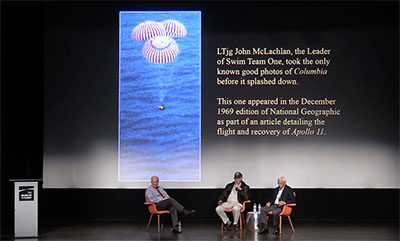 |
LM-12
Member Posts: 4050
From: Ontario, Canada
Registered: Oct 2010
|
 posted 03-31-2023 11:46 PM
posted 03-31-2023 11:46 PM
  
In the Museum of Flight video linked above, Apollo 11 Flight Surgeon Bill Carpentier (who was in the recovery helicopter} says that Armstrong was the first astronaut into the helicopter, then Collins came up, and then Aldrin came up. So that means the black and white photo posted back on 11-26-2018 of the astronaut in the recovery net is not Armstrong. It is Aldrin, just as I suspected. |
Blackarrow
Member Posts: 3796
From: Belfast, United Kingdom
Registered: Feb 2002
|
 posted 04-01-2023 09:18 AM
posted 04-01-2023 09:18 AM
  
quote:
Originally posted by Robert Pearlman:
Helicopter pilot Bruce Johnson addressed this...
Thanks, Robert. Yes, that's the better of the two pictures I have seen. It certainly doesn't match the quality of splashdown photos from many other Apollo missions, particularly the final three, but at least it fills a gap in the photographic record of Apollo 11. It really should be included in NASA's digital photographic databases of Apollo 11.As well as 'National Geographic,' this photo also appears at page 301 of the 40th anniversary edition of Taschen's huge "Moonfire" book based on Norman Mailer's account. The page number may be different for the 50th anniversary edition. (By the way, page 300 of "Moonfire" has a high-quality colour photo taken from directly above 'Columbia' after the flotation collar had been fitted. I don't remember seeing such a view from any other Apollo mission, although I assume many similar photos were taken.) Here is the actual splashdown picture, as printed in "Moon Men Return" and taken by Mitch Bucklew on board the Swim ONE helicopter. I assume it has not been seen (much) because it is grainy and a little indistinct, but since it seems to be unique (taken, I estimate, a couple of seconds after impact, with the circle of white water still surrounding 'Columbia') it should form part of the wider photographic record of Apollo 11. 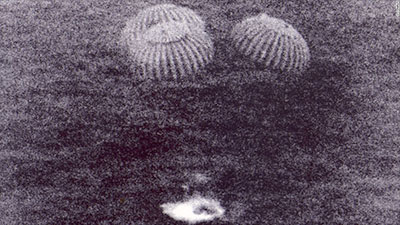 |
Lou Chinal
Member Posts: 1390
From: Staten Island, NY
Registered: Jun 2007
|
 posted 04-01-2023 03:37 PM
posted 04-01-2023 03:37 PM
   
quote:
Originally posted by ea757grrl:
...it makes more sense to me that the other gantry crane offloaded the CM.
I am going to agree with Jody on this one (ea757grrl). |
LM-12
Member Posts: 4050
From: Ontario, Canada
Registered: Oct 2010
|
 posted 04-01-2023 07:57 PM
posted 04-01-2023 07:57 PM
  
The photos seem to show that both the MQF and the CM were lifted with 15-ton capacity cranes.There still appears to have been a larger crane on the port side of the bow, probably on a barge. Why it was there, I have no idea. |
LM-12
Member Posts: 4050
From: Ontario, Canada
Registered: Oct 2010
|
 posted 06-24-2023 03:25 AM
posted 06-24-2023 03:25 AM
  
Apollo 11 16mm Magazine 1125 has some re-entry film footage. The film is very dark, but at 03:39 you can see underexposed parachutes. This is mentioned in the film description.At 03:44, you can briefly see what looks like the parachute risers. (Film enhancement might show more details.) |
Bob Fish
New Member Posts: 7
From: Danville, CA
Registered: May 2009
|
 posted 01-31-2025 03:30 PM
posted 01-31-2025 03:30 PM
   
quote:
Originally posted by Blackarrow:
...why are pictures of the Apollo 11 splashdown (i.e. Columbia hanging from its parachutes and hitting the water) not widely available?
The morning sky was just starting to lighten (5:40 a.m. local time) yet there were significant high level clouds covering the area (10,000 ft) so there was no direct sunlight. Also, the HS4 SWIM helo pilots were warned by the Air Boss to stay away from the predicted impact site inasmuch as they might have the command module drop right on top of them.
As it was, SWIM 1 (#53 piloted by LCDR Don Richmond) was very close and Bucklew was able to get the "grainy" shots of it descending and hitting the water. The Photo helo (#70 piloted by Andy Patrick) as well as Recovery 1 (#66 piloted by CDR Donald Jones) were stationed well away from the predicted impact site to prevent possible interference with the SWIM 1 and SWIM 2 helos and/or the CM itself as it descended under the three giant ringsail parachutes.Photos were less important than safety! 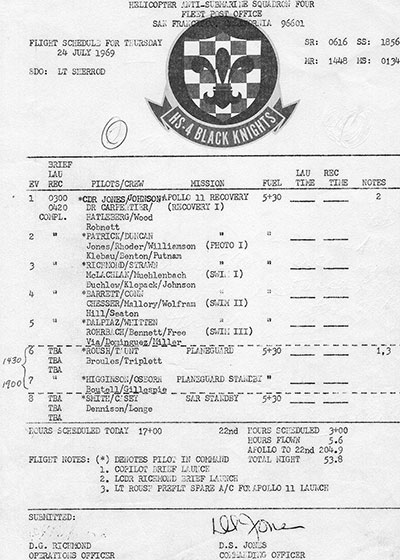 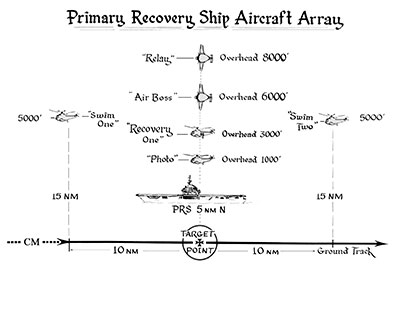
As a historical footnote, while the CM landed closest to the SWIM 1 helo, it ended up in Stable 2 position after the wind billowed the parachutes and pulled it over. Clancy Hatleberg (OIC for the UDT team) decided to use that eight minute "righting period" to bring SWIM 2 to the site and deploy them. That's because two members — Mike Mallory and Wes Chesser — had just done the recovery of Apollo 10 and had more experience. There was a fairly high sea state to deal with making things more difficult than during SIMEXs the prior 10 days. Here is a photo taken from the USS Arlington (AGMR-2) which is where President Nixon spent the night of July 23. 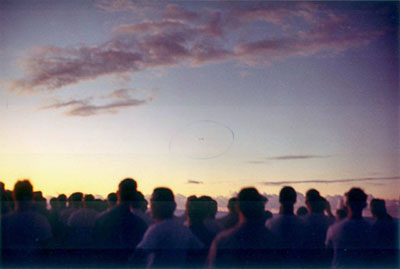 In the very center you can see the spacecraft descending, having just broken thru the high clouds.
Clearly, the sun has not risen high enough to light up the splashdown moment. 15 minutes later and there would have been some nice photos.
SWIM 1 is in there "somewhere" at 1000ft but I can't make it out! |
Bob Fish
New Member Posts: 7
From: Danville, CA
Registered: May 2009
|
 posted 01-31-2025 11:41 PM
posted 01-31-2025 11:41 PM
   
quote:
Originally posted by LM-12:
There still appears to have been a larger crane on the port side of the bow, probably on a barge. Why it was there, I have no idea.
There were two cranes – the one in the back of the Hornet unloaded the MQF onto a USAF cargo pallet loader, which then drove 50 feet to the pierside welcoming group and speeches. Once done, it then drove the MQF to Hickam AFB for their flight back to Houston.
Shortly thereafter, the other crane offloaded Columbia from the flight deck. Not sure if anyone is still interested but here's some photos. 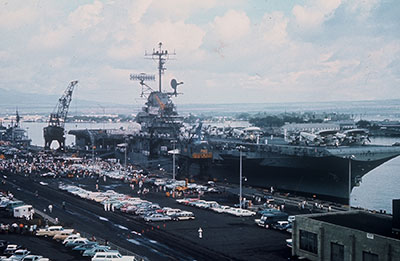 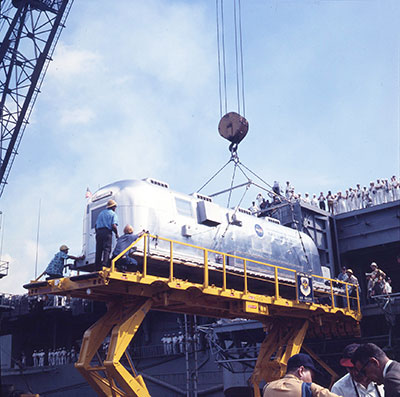
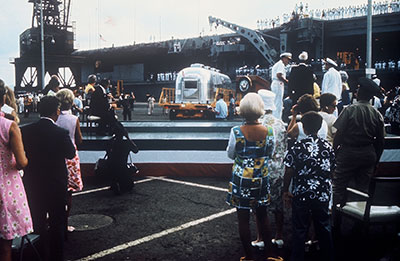
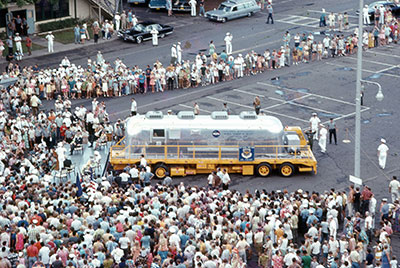
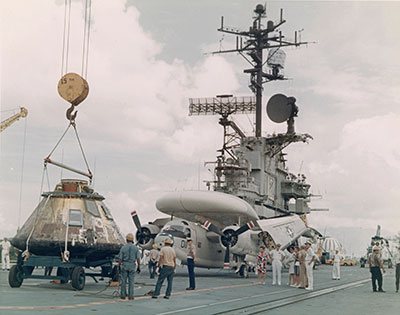
One of my all time favorite photos is this one below, showing the motorcade during its drive to Hickam AFB. Virtually no one notices the USS Arlington AGMR-2 heading up the channel into port, after having been the lodging for Richard Nixon a few days earlier. 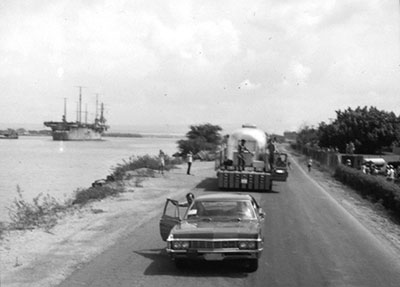 Arlington was actually much closer to the splashdown point (5 miles), since Hornet stayed 12 miles upwind to make sure President Nixon didn't get contaminated by the air venting out of the CM as it came down under parachutes. 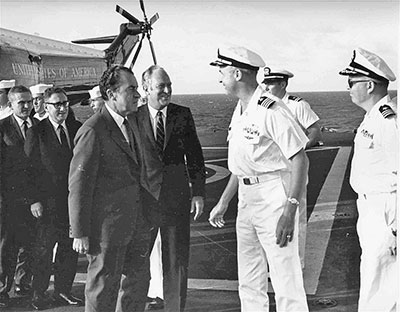 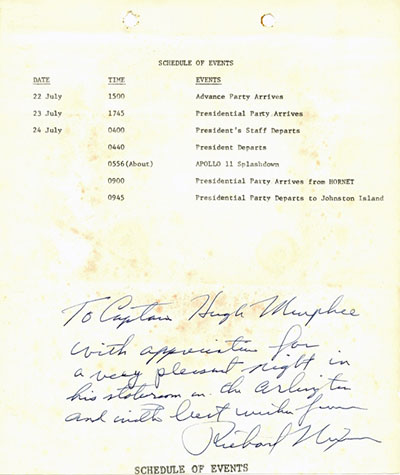
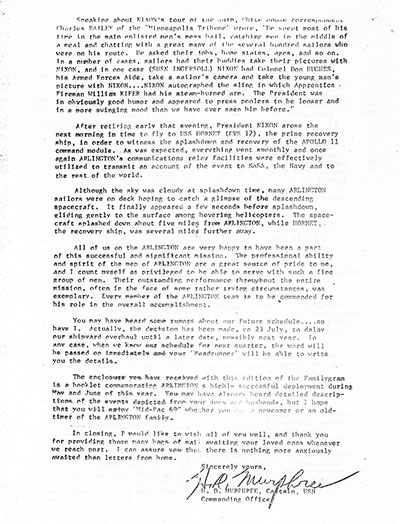
|
LM-12
Member Posts: 4050
From: Ontario, Canada
Registered: Oct 2010
|
 posted 02-01-2025 02:16 AM
posted 02-01-2025 02:16 AM
  
Fascinating details about the splashdown and recovery. Thank you for sharing all this with us. There is a colour version of your USS Arlington photo on page 1. |
Bob Fish
New Member Posts: 7
From: Danville, CA
Registered: May 2009
|
 posted 02-01-2025 07:09 PM
posted 02-01-2025 07:09 PM
   
quote:
Originally posted by LM-12:
But wasn't that Aldrin, and not Armstrong?
To begin the decon process, Clancy Hatleberg opened the CM hatch, threw the bag of BIGS (biological isolation garments) into the CM and closed the hatch.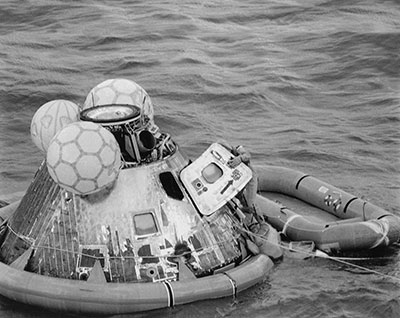 Due to space constraints inside the CM, Armstrong was the first person to don the garment. Collins was second and Buzz was third. 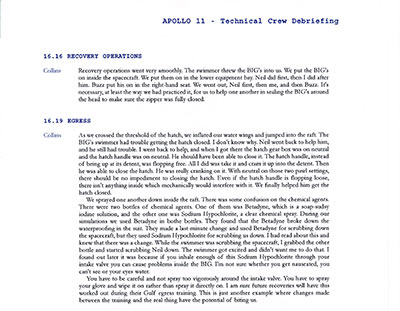 Also, they exited the CM in the same manner – Armstrong first, Collins second and Buzz third. As practiced in the Gulf of Mexico on May 24, 1969, for weight and balance reasons, they assumed the same positions in the raft – Armstrong to the rear, Collins in the middle and Buzz in the front. quote:
The position of the white label...
Aldrin is in the front as you can see by his name tag and it does look like the white seal on his face mask canister is more to the right side than Collin's.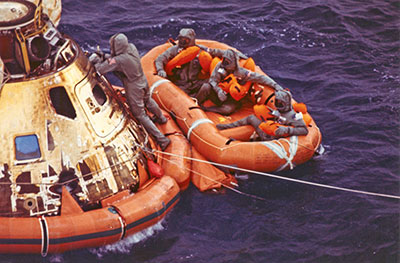 Clancy moved about the raft very carefully to decontaminate their BIG suits with sodium hypochlorite. In this photo he is finishing up with Armstrong's BIG booties and preparing to do Collins next. And, yes, using pretty much the same type mitt we all wash our cars with! 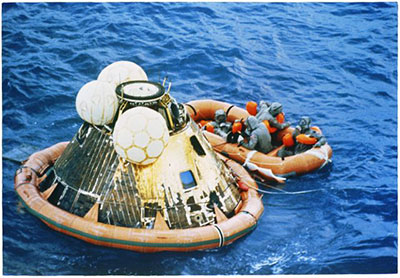 As well, they were hoisted by Billy Pugh net in that same order – Armstrong, first, Collins second, Buzz third. However, as Armstrong enters the net, he is facing outward (this is known to be Armstrong because the other astronauts are still in the raft). 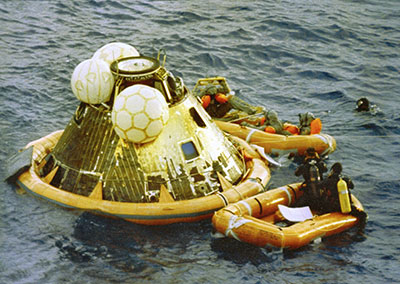 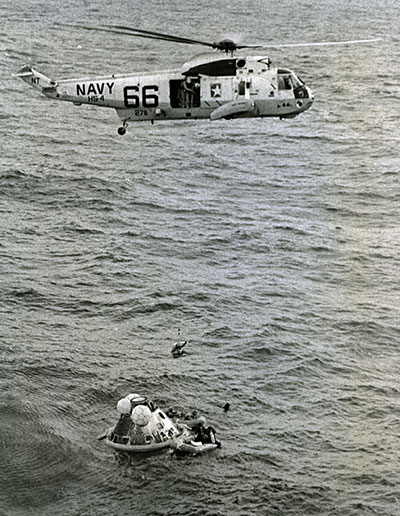
The astronaut in the photo in question is facing sideways. 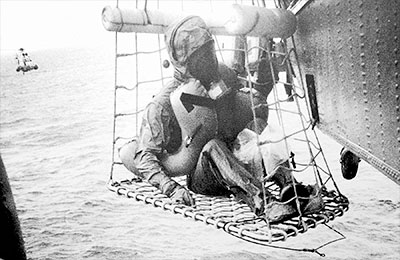 Both of these photos were taken by Milt Putnam from the Photo helo. Once you are being hoisted, you do not change positions. While it seems logical the BP net photo would be of Armstrong for historical reasons, the camera on the helicopter was simply set in "capture mode." I appreciate the photo interpretation raised earlier in this thread having to do with the location of the seal on the facemask, which does appear to be Aldrin. |
LM-12
Member Posts: 4050
From: Ontario, Canada
Registered: Oct 2010
|
 posted 02-02-2025 03:32 PM
posted 02-02-2025 03:32 PM
  
Any idea what was in the plastic bag between his knees in the Billy Pugh net? |
ea757grrl
Member Posts: 818
From: South Carolina
Registered: Jul 2006
|
 posted 02-02-2025 08:51 PM
posted 02-02-2025 08:51 PM
   
Interested to see in the first of the additional photos Bob posted, that if you look on the left side of the picture, you can see USS Carpenter (DD-825) aft of Hornet. Carpenter was part of the recovery team and provided support for President Nixon's visit.Great photos, Bob! Thanks for sharing them. |
Bob Fish
New Member Posts: 7
From: Danville, CA
Registered: May 2009
|
 posted 02-04-2025 05:37 PM
posted 02-04-2025 05:37 PM
   
On July 23 and 24, 1969, the USS Carpenter (DD-825) provided logistical support for the President's flights between Johnston Island and the splashdown area. It was used as a navigational beacon for the HMX-1 pilots, Marines who were not used to flying over open ocean. It was also on standby as a rescue vehicle (plane guard in naval aviation parlance) in case one of the VH-3 Seakings had a mechanical problem. Although Carpenter was assigned to TF-130, it's not mentioned in the after action reports so there is very little awareness of her role in the Apollo 11 recovery.
These photos were all taken by Dan McDyre flying one of the HMX-1 support helicopters for the presidential group:The first photo was taken in mid-morning of July 24, as President Nixon returned to Johnston Island from the splashdown site, giving a salute to the Carpenter officers and crew.
The second photo shows Marine One landing on the USS Arlington AGMR-2 flight deck on the evening of July 23, the ship that provided overnight lodging for the Presidential party.
The third shows President Nixon exiting Marine One and being greeted by Captain Hugh Murphree, CO of Arlington.
The fourth photo shows how the HMX-1 helicopters were transported to and from Johnston Island by C-133 Cargomaster aircraft. 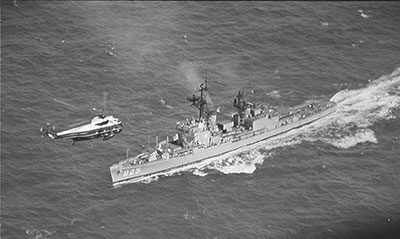 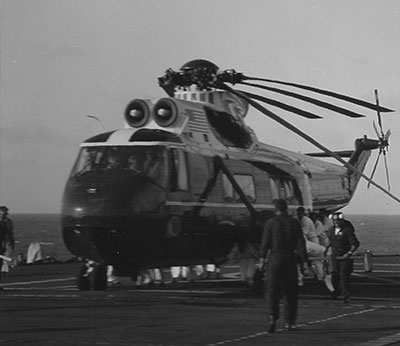

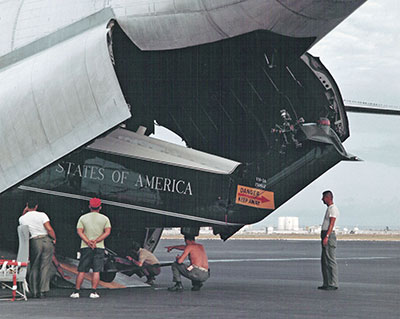
|
ea757grrl
Member Posts: 818
From: South Carolina
Registered: Jul 2006
|
 posted 02-04-2025 06:37 PM
posted 02-04-2025 06:37 PM
   
I've long been trying to compile a log of all the aircraft aboard Hornet for the Apollo 11 recovery, and I think I had all of them except the VH-3As. That photo of 150612 being unloaded is one more piece of the puzzle. 150612 went down at sea off the Bahamas in May 1973. It was recovered and ended up in the salvage yard at NAS Jacksonville. A couple of chiefs managed to get it hauled over to be used as a training aid by HS-1 for the Fleet Readiness Aviation Maintenance Program. Don't know its ultimate fate, though (likely scrapyard). |
Bob Fish
New Member Posts: 7
From: Danville, CA
Registered: May 2009
|
 posted 02-04-2025 07:19 PM
posted 02-04-2025 07:19 PM
   
During the covid lockdown, when everyone was getting bored, Fabio Pena (of NavSource) and I examined every photo we could as well as read the log books of various squadrons.
Attached is what we came up with (does not include the President's helos).
What made it a tad more confusing is the Navy changed its aircraft MODEX numbering scheme from two digits to three in between the two recoveries! Only #66 stayed the same for Navy PR reasons. It takes really sharp eyes to read the BuNo on the side.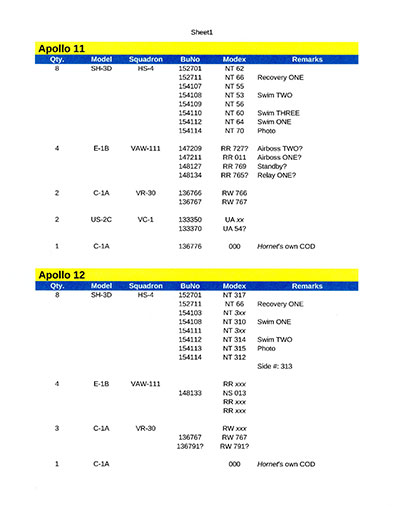 |














































